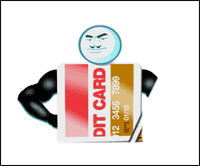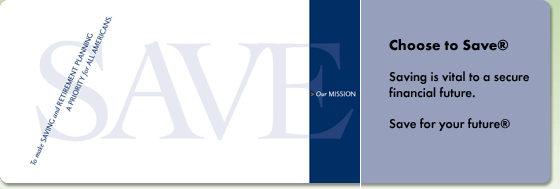 HOW TO PREPARE FOR RETIREMENT
HOW TO PREPARE FOR RETIREMENT
Want to know how much you should save for retirement?
The Ballpark E$timate® is an easy to use interactive tool which helps you to quickly identify approximately how much you need to save to fund a comfortable retirement.
A central question to retirement planning is, how long will I live?
It is important to consider because you do not want to outlive your money. Try taking the following longevity calculator Living to 100.
What will be the impact on my take home pay if I increase my contribution to my 401(k) plan?
Use this payroll deduction calculator.
When it comes to retirement planning and saving, what kind of person are you? Are you a planner, saver, struggler, impulsive, or denier?
Take the Retirement Personality Profiler quiz and find out!
So you think you're preparing well for your retirement, but are you really?
Use this quiz to determine your Retirement Readiness Rating (R3).
 HOW TO COMBAT CREDIT CARD GUY (TIPS FOR MANAGING DEBT)
HOW TO COMBAT CREDIT CARD GUY (TIPS FOR MANAGING DEBT)
Do you know what is on your credit report?
Most people do not yet what is on this report has serious implications for your financial life. You can get a free credit report today. Learn how from the Federal Trade Commission's document, Your Access to Free Credit Reports.
Do you have more than one credit card with a balance, an auto loan, a student loan, a personal loan?
Use this Debit Management Calculator to determine how much you owe and how long it will take to pay off that debt.
 HOW TO COMBAT MR. UNEXPECTED (TIPS FOR BUDGETING)
HOW TO COMBAT MR. UNEXPECTED (TIPS FOR BUDGETING)
Do you have a personal spending plan that allows you to save enough money to achieve your goals?
The National Endowment for Financial Education's SmartAboutMoney.org will help you draw a spending map so you don't get lost. In four short steps identify income, list expenses, compare income and expenses, and set priorities and make changes -- you can make sure your day-to-day expenses do not distract you from your long-term spending goals. One of the 10 basic steps to getting smart about money.
Need help balancing your checkbook?
Use this Balance Your Checkbook calculator.
Do you have any emergency savings?
Having adequate emergency savings can make unforseen unemployment, auto repairs, medical emergencies, property damage and even legal issues more manageable. This Emergency Savings Calculator helps you determine how much emergency savings you may need and how you can begin saving toward this important goal.
 HOW TO TALK WITH YOUR KIDS ABOUT MONEY
HOW TO TALK WITH YOUR KIDS ABOUT MONEY
Is there a tool that will help students learn the complexities of investing?
Visit the Stock Market Game™. The Stock Market Game™ gives students the chance to invest a hypothetical $100,000 in an on-line portfolio. They think they're playing a game, but you know they're learning economic and financial concepts that they'll use for the rest of their lives.
Do you know how to talk to your children about money?
Talking Money with Your Kids, provided by Consolidated Credit Counseling Services, Inc., is a good place to start. It offers strategies for talking with your kids about money, and teaches them valuable skills that can last a lifetime.
How do I get my teenager to become more financially savvy?
The Money Talks Web site, from the University of California Cooperative Extension, offers teens, and their teachers, a fun and interactive opportunity to learn about money management. Teens can play games, take quizzes, watch videos, read or download colorful teen guides, and more. The Web site is available in English or Spanish.
 HOW TO AVOID THE SUB-PRIMATE
HOW TO AVOID THE SUB-PRIMATE
Where can I turn for help if I am facing a foreclosure?
There are several resources available for you provided by the federal government. The Federal Reserve, Board of Governors maintains a Web site containing all of the different resources provided by various federal government agencies on foreclosure. Foreclosure Resources for Consumers
How can I determine which mortgage is best for me?
The Federal Reserve Board of Governors has a Mortgage Comparison Calculator designed to help you compare the monthly payments and the amount of equity you will build in your home for several types of fixed and adjustable-rate mortgages.
What should I do, rent my home or buy my home?
Ginnie Mae provides some resources for you to help you determine which is better for you, to own your home or to buy it.
How much can I afford to spend on a home?
Ginnie Mae provides an Affordability Calculator to help you determine how much you can afford to spend on your home purchase. However, keep in mind that many additional factors are involved with the loan qualification process.
 Savings Tips from Savingsman™ and Benjamin Bankes
Savings Tips from Savingsman™ and Benjamin Bankes
Savingsman™ says:
This is the time of year when many people receive their tax refund. Consider some of these options for a portion of your tax refund
:
Make an extra payment on your credit card, spend down that debt.
Purchase U.S. government savings bonds which can be purchased directly from the Treasury's web site such as I Savings Bonds.
Open a traditional IRA or a Roth IRA.
Benjamin Bankes says:
Do you ever wonder where your money goes each month? Does it seem like you're never able to get ahead? If so, you may want to establish a budget to help you keep track of how you spend your money and help you reach your financial goals.
In times of crisis, you don't want to be shaking pennies out of a piggy bank. Having a financial safety net in place can ensure that you're protected when a financial emergency arises. One way to accomplish this is by setting up a cash reserve, a pool of readily available funds that can help you meet emergency or highly urgent short-term needs.
Sign-up to receive weekly savings tips at www.feedthepig.org.











